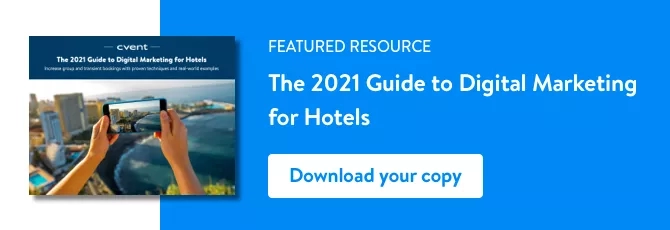As the world increasingly prioritizes green, eco-friendly initiatives, it's as important as ever for event professionals and venues alike to work together to make sustainable meetings and events part of their overall strategies.
In fact, a recent PromoLeaf survey of event attendees conducted by Censuswide found that 85% of respondents prefer or strongly prefer attending conferences with sustainable practices. And, according to a Publicis Sapient survey, 58% of consumers say that the COVID-19 pandemic has caused them to think more about the environment.
To meet the needs of event professionals and their attendees, suppliers can help craft meetings and events that take the environment into consideration. In this post, we explore the importance of sustainable meetings and events, including how venues can create them, promote them, and collaborate with planners throughout the process. We also provide a handful of real-life examples and initiatives to take inspiration from.
Creating sustainable meetings and events: 4 tips to know
1. Compost and recycle.
Even with a good composting and recycling program at a venue, a mid-sized corporate tradeshow with around 5,000 attendees will still go through tons of waste. Recyclables typically make up 35% of the total waste, and 21% is organic waste that includes compostables. Forty-one percent of waste will still go to landfill.
As an example of composting onsite, 137 Pillars House in Chiang Mai, Thailand, recycles over 90 percent of its garden and kitchen waste. It is either composted or turned into biochar, which both go right back into the hotel’s gardens and grounds.
Because of the pandemic, recycling is even more crucial. “Right now, there is a critical need for raw materials in the manufacturing supply chain, especially paper and cardboard,” EPA administrator Andrew Wheeler said in a statement. “Business closures and limited operations means less recycled material for American manufactures, and we all must do our part to recycle more and recycle right to fill this immediate need.”
When it comes to events, recycling plastic bags is an easy way to reduce your carbon footprint and help the supply chain. Think of all the errant plastic bags that are left at events. Collect them and reuse them or take them to a supermarket to be exchanged or recycled.
2. Provide sustainable F&B options.
Sustainable meetings and events aren't only related to things like recycling and green credentials. They stretch to food and beverage choices, too. The same PromoLeaf survey cited above found that event attendees under the age of 34 have a notably strong preference for sustainable dining practices.
An article from Corporate Event News says a sustainable event menu starts with knowing the origin of the food you are serving. Local, seasonal produce is a better environmental choice: It has less distance to travel from farm to consumer, and since it is in season, it does not require artificial hothouses in order to grow. A study from Oxford University and the University of Minnesota found that red meat has the highest impact on the environment. “Meat-free Mondays” and offering vegetarian and plant-based options are some ways to create a more sustainable menu.
With sustainable F&B, it isn’t just about the type of food, but the quantity, too. At events, there’s often the “fear of running out of food.” Technology can be used to mitigate this and more accurately determine how many people will be attending the conference, so the right amount of food can be prepared.
For example, Fairmont Washington, D.C., Georgetown reduced the number of overproduced meals for conferences and meetings by opting for by-the-minute prep adjustments instead of the standard 5% event overage.
3. Reduce waste.
Reducing waste, in general, is another way to lessen an event’s impact on the environment. Recycling and composting both help with this, but there are preventative behaviors planners and venues can use to reduce waste.
Many venues have gone the route of eliminating the use of plastic straws and other single-use plastics, which greatly reduces the amount of waste and plastic that finds its way to the oceans. Items made from bamboo or sugarcane, or other compostable types of cutlery, cups, containers, and plates are alternative sustainable options for single-use plastics.
For example, Marriott International pledged to replace single-use toiletry bottles with large pump dispensers. This is “expected to prevent about 500 million tiny bottles annually from going to landfills; that’s about 1.7 million pounds of plastic, a 30 percent annual reduction from current amenity plastic usage.”
Additionally, disposable masks and PPE will continue to be a part of safe meetings for the time being, which adds up to even more waste. Consider offering reusable masks — some venues are taking this as an opportunity to produce branded, unique, high-fashion, or luxury masks as amenities for guests. If disposable PPE must be used, look into recycling options like TerraCycle or reducing waste in other ways. For example, Sangri-La hotels in Southeast Asia have donated their used linen to be turned into reusable facemasks — a great example of reusing materials to reduce waste.
4. Connect attendees to eco-friendly transportation.
Travel can account for up to 80% of an event’s carbon dioxide emissions. Since air travel has a large impact on the environment, planners will likely look for venues that can provide more ecologically-conscious methods of transportation once onsite. If your venue is accessible to public transportation, highlight that on your website. Or, partner with a public transportation provider to offer reduced rates on fares for event attendees. Once COVID-19 has waned, carpooling and a shuttle bus service will again become viable options for shared transportation.
Consider providing electric car charging stations, or connecting attendees with hybrid or electric cars. Let planners know if your venue is close to bike-sharing options, or if it is walking distance to nearby attractions and convention centers. Globally, 69.2% of hotels provide bike storage, subsidized public transportation passes, shuttle buses, and parking for low emission vehicles. About 48% of hotels in the Americas provide electric vehicle charging stations.
Promoting sustainable meetings and events: 4 tips to know
1. Leverage social media to tell your story.
It benefits your venue to share your green initiatives and your sustainability story on your social media channels. Share best practices and educate your followers on how your actions are having a positive impact. If you eliminate single-use plastic or go meat-free at one of your events, explain why and craft a social media post or campaign around it to share with your followers. Maybe a planner will see the work you’re doing and will want to partner with you to make their next event a sustainable one.
Assisting planners with making a sustainable event that is also “Instagrammable” is another way to market your venue’s green meeting capabilities. “People talk and they share things really quickly on social media,” said John Kelly, BCD Meetings & Events. Creating an appealing visual atmosphere or having specific branded hashtags are a few ways to increase the social media appeal. “The limitless PR and social media (associated with sustainable meetings and events) will set you apart from the crowd if you start doing it now,” Kelly says. “Shout about it. Make a big deal about it, and people will engage with that.”
2. Get planners and guests involved.
Venues can connect event attendees and guests with sustainable volunteer opportunities and community initiatives they can participate in while onsite. In a survey commissioned by IHG Hotels & Resorts, 57% of respondents said they now care more about doing their part to help local communities and the planet while traveling than they did 10 years ago.
Think about how you can not only inform guests, planners, and attendees about your own initiatives, but invite them to participate. Maybe that’s through opening up space for those who want to join you for volunteer days in your community, or perhaps organizing your own event onsite for cleaning up the beach or venue grounds.
For example, Alila Manggis, Indonesia is a champion for local coral reef conservation. The hotel invites locals, employees, and guests to join them in a monthly beach cleanup where they collect plastic and educate people on the important role of coral reefs, and how the work of Alila Manggis is contributing to the cause.
3. Create a dedicated section of your website or Cvent microsite.
A Greenview survey of over 4,500 hotels found that 55% have a dedicated portion of their website for sharing green practices.
Publish your green policies and environmental impact on your website in an easy-to-find location. Posting this on your website is great for educational purposes and transparency, but it also benefits your website itself. Using keyword terms like “sustainable event venue” or “green hotel” could boost your hotel's SEO and help you to be more easily found by planners who are sourcing venues to host their sustainable meetings and events. Or, add the information to your Cvent microsite, giving planners visibility into your sustainability policies right where they source venues.
Incorporate green and compliance logos into your marketing and any other relevant materials so that it’s clearly labeled with that visual cue. Write blog posts to provide updates on your ongoing or upcoming projects, sustainable event success stories, and the results of initiatives. It’s a great opportunity to tell your story, educate guests and planners, and increase the visibility of your website.
As an example, Proximity Hotel in Greensboro, North Carolina invites guests to “stay in sustainable style” right from their homepage. They also include an LEED Platinum logo, an NPR podcast where they discuss their green practices, and a link to learn more about the specifics of their sustainability. Proximity Hotel also provides a resource page with links to other reputable websites that supply more information on sustainable practices and certifications, which helps to position them as a thought leader and trusted source.
4. Publish case studies, green meeting guides, checklists, and tip sheets.
To take it a step beyond communicating your green initiatives and sustainability on your website, consider positioning yourself as a thought leader in the sustainable tourism and meetings and events space.
Publish case studies of past sustainable meetings and events you’ve held at your property and explain how you partnered with the planner to make it a success. Discuss the impact of the event and how you contributed to helping the planner meet their sustainability goals. Create green meeting guides with best practices and ways planners can reduce the impact of their event. Sustainability tip sheets and checklists are quick wins and can also be downloadable gated content, allowing you to capture interested leads
For example, Music City Center in Nashville, Tennessee releases a sustainability newsletter, the “MCC Green Times,” that provides updates on onsite initiatives and projects about sustainability. They also have a tip sheet for green meetings and more sustainable travel.
Put this sustainable meetings and events guide to use today!
Events produce a large amount of waste, and it’s up to venues to partner with event planners to reduce it through eco-friendly practices and sustainable initiatives. Sustainability can mean different things to different planners. Find out what metrics are most important to them and what their goals are, and see if you can work together to achieve them.
Up next, take an even deeper dive into sustainable meetings and events by downloading our free ebook. Then, go well beyond the world of meetings and events by exploring 25 of our favorite eco-friendly hotel ideas.







